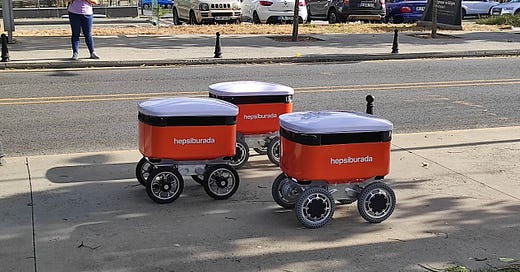Delivers.AI Rolling Out New and Improved Delivery Robots in Western Europe and Dubai
How labor pressures and lidar-less navigation could give the company a lift.
During interviews with various food automation companies over the past couple of weeks, Delivers.AI kept coming up. The last time I wrote about Delivers.AI this past January, it had a tiny robot and had just started making deliveries in Istanbul, Turkey. So I was curious — Why the heck are so many people talking about Delivers AI right now?
Turns out, a lot has changed for the robot delivery company over the past nine months.
London Calling, European Road Trips
First off, Delivers AI moved its headquarters to London to better focus on entering the UK and Western European markets.
“There is a huge demand for our delivery robots in UK and Western European Countries because of the new landmark law in those countries,” Delivers.AI Founder and CEO Ali Kutay Yarali wrote in a recent email to me. Yarali was referring to new laws in the UK and Spain requiring delivery services to classify their workers as employees and not contractors. Delivery services have fought to keep their gig drivers as independent contractors to avoid paying minimum wages and providing benefits, and these new laws will make it more expensive for delivery services to operate.
At the same time, Yarali went on to explain, COVID has restricted migrant travel into the UK and other European countries which in turn closed off a source of cheaper labor for delivery companies.
Given all this, Yarali said delivery services are looking to robots like those from Delivers.AI to provide a cost-effective means of food delivery.
Like what you’re reading? Sign up for the full OttOmate experience with earlier access and deeper analysis.
Delivers.AI aims to capitalize on these changes and establish a beachhead in Western Europe. To do this, the company is participating in a number of different urban initiatives such as the EIT Urban Mobility Programme in Munich, Germany and 5PRING Wayra Programme in West Midlands in the UK.
In his email to me, Yarali said that these programs are working with city councils to explore ways of decreasing delivery drivers in congested city centers and converting those deliveries to environmentally friendly, autonomous methods.
In a follow up phone call, Yarali told me that Delivers.AI will have two delivery robots operating in Madrid, Spain by the end of October this year, and will have five delivery robots in operation in Birmingham, England at the beginning of next year.
In addition to these Western European Markets, Delivers.AI will be making commercial deliveries for HEPSIBURADA, a Turkish e-commerce company, across five different universities in Turkey over the coming year. Delivers AI will also be launching two delivery robots in Dubai by the end of this November.
Delivers.AI, Robot
Delivers.AI will be launching in all these new markets with a whole newfangled robot. Gone is the tiny rover! In its place is a new (mostly) autonomous ‘bot sporting an expanded 90 liter cargo space (up from 20 liters), new tires than can climb 20 cm sidewalk curbs, and a new navigation system that removed lidar in favor GPS and computer vision. Yarali told me that the removal of lidar means the robots cost less than $5,000 to produce.
Delivers.AI is also pitching itself as a B2B robot service that will charge clients a per delivery fee (along with an initial setup fee). The company won’t offer its own Deliver.AI branded app with its own marketplace, and will instead integrate with an existing partner’s app.
Yarali says this B2B move helps differentiate Delivers.AI from other players such as Starship, which has consumers download the Starship app to place their order. Starship, which started in Estonia and has been operating robot deliveries in the UK for years, seems to be Delivers.AI’s main European rival at this point. That rivaly undoubtedly ratcheted up last week when Starship announced an expanded deal with convenience store chain Co-Op to put a total of 500 delivery robots in operation across five UK cities and towns.
Competition is good, however, and Delivers.AI will undoubdetly be facing more of it as labor and COVID pressures continue to accelerate the adoption of autonomous (and contactless) delivery.
As such, I’m sure I’ll be hearing the name Delivers.AI — and a whole raft of new robot startups — a lot more over the coming months.




